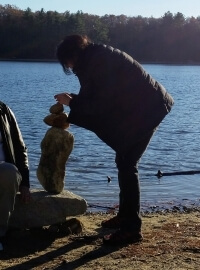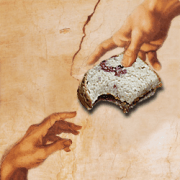Thoreau, Volume 2: Still Sh*tty After All These Years
I had a pretty good idea when I penned Henry David Thoreau: Beloved Bullshit Artist in 2017 for Worldwide Weird Holidays that few would care. But those who did take notice also took umbrage. Some were angry I’d devalued their Thoreau memes, as if such a thing were possible. Another felt I’d insulted the grandchildren who’d gifted her a mug bearing a famous quotation.

trying to undo the damage
Last year, during a visit to Walden Pond arranged by my brother, he questioned the basis for the intensity of my disdain for Thoreau as I mused about knocking over a cairn carefully arranged by devotees. It’s true that the loudness of my opinion can be inversely proportional to my level of knowledge of the subject at hand. So, I decided to search for sources, verifiable ones, beyond my fevered English-majorette’s brain. Apparently, my penance for disliking Thoreau is reading scads of writing by and about him in order to support my view.
I should explain this photo. I did end up accidentally knocking some loose stones off the top of a cairn while hamming it up for the camera. In my defense, that particular cairn was anchored to a rock at the water’s edge to provide a photo op for visitors; I didn’t know that someone had balanced pebbles on top of it. My brother was highly amused and snapped a whole series of pics documenting my futile attempts to put them back. I’m pretty sure I felt worse about that than Thoreau did about burning down the woods.
You read that right. A year before his stay in the woods, Thoreau accidentally started a forest fire while cooking his day’s catch. It burned 300 acres according to the May 3, 1844, issue of the Concord Freeman newspaper. Six years later, in an entry that would later be published in The Journal of Henry David Thoreau, he admitted to setting the fire for which he was widely reviled by area residents while still managing to absolve himself of all responsibility.
I said to myself, “Who are these men who are said to be the owners of these woods, and how am I related to them? I have set fire to the forest, but I have done no wrong therein, and now it is as if the lightning had done it. These flames are but consuming their natural food.” It has never troubled me from that day to this more than if the lightning had done it. (The trivial fishing was all that disturbed me and disturbs me still.) So shortly I settled it with myself and stood to watch the approaching flames. It was a glorious spectacle and I was the only one there to enjoy it.
That’s quite a rationalization for the man who would become a hero to conservationists everywhere. This is what he wrote in the aftermath of an 1849 shipwreck that washed up, by his account, 28 or 30 bodies of Irish men, women, and children who had emigrated in hopes of a new life. This passage is taken from Entry I of Cape Cod.
On the whole, it was not so impressive a scene as I might have expected. If I had found one body cast upon the beach in some lonely place, it would have affected me more. I sympathized rather with the winds and waves, as if to toss and mangle these poor human bodies was the order of the day. If this was the law of Nature, why waste any time in awe or pity? If the last day were come, we should not think so much about the separation of friends or the blighted prospects of individuals. I saw that corpses might be multiplied, as on the field of battle, till they no longer affected us in any degree, as exceptions to the common lot of humanity.
In Walden, Thoreau extolled the virtues of a simple existence. Had he lived his whole life in a tiny house, I might find his philosophizing more believable. (According to The Walden Woods Project, he lived there for two years, two months, and two days.) Had he not lived within walking distance of his parents’ house, which he visited several times a week, or had his mother and sisters visit weekly to bring him food, clean his cabin and wash his clothes, I might find his exhortations more sincere. As Kathryn Schulz writes in The New Yorker:
The hypocrisy is not that Thoreau aspired to solitude and self-sufficiency but kept going home for cookies and company. That’s just the gap between aspiration and execution, plus the variability in our needs and moods from one moment to the next—eminently human experiences, which, had Thoreau engaged with them, would have made for a far more interesting and useful book. The hypocrisy is that Thoreau lived a complicated life but pretended to live a simple one. Worse, he preached at others to live as he did not, while berating them for their own compromises and complexities.
Garrison Keillor called Thoreau “a sorehead and loner whose clunky line about marching to your own drummer has found its way into a million graduation speeches. Thoreau tried to make a virtue out of lack of rhythm. He said that the mass of men lead lives of quiet desperation. OK, but how did he know? He didn’t talk to that many people. He wrote elegantly about independence and forgot to thank his mom for doing his laundry.”
Finally, let me quote my original post about Thoreau:
Exhortations to simplify one’s life can be helpful, but they often mask disdain and smug superiority. Thoreau reminds us of the intrepid explorer in a documentary, ostensibly forging a path trodden moments before by the cameraman walking backward in front of him.

not a great mug
Who needs Thoreau for inspiration? My quotation probably wouldn’t fit so well on a mug, though.
By the way, if you’re interested in doing your own research, the works by Thoreau I’ve cited here and 18 others are available for free via Project Gutenberg.
I recommend reading At Walden, Thoreau Wasn’t Really Alone With Nature, a New York Times piece that provides a different perspective of Walden and the freed slaves and other “untouchables” who had no choice but to make their home there.
![]()



 Today is the 200th anniversary of Henry David Thoreau’s birth on July 12, 1817. The fondness and nostalgia his name evokes are undeniable. National Simplicity Day was created many years ago to commemorate his birthday each year.
Today is the 200th anniversary of Henry David Thoreau’s birth on July 12, 1817. The fondness and nostalgia his name evokes are undeniable. National Simplicity Day was created many years ago to commemorate his birthday each year.